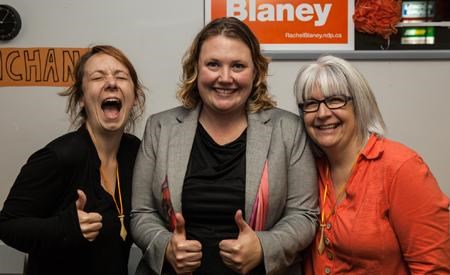Like red Liberal election signs turning orange in the summer sun, so did the BC coast on election night.
A majority of voters in the newly-created North Island-Powell River riding cast their ballots to send New Democrat Party (NDP) candidate Rachel Blaney to Ottawa as their member of parliament (MP).
“I’m so proud to represent this riding, but at the same time very unhappy to see tonight’s outcome,” said Blaney. “Unfortunately, people thought the change was going to be in the Liberal Party.”
With 11 of 278 polls still unreported as of 9 am Tuesday, October 20, NDP had 40 per cent (22,836) of the vote, trouncing Conservative Party of Canada candidate Laura Smith by close to 8,000 ballots. Smith took 26.2 per cent (14,960), while Liberal Party of Canada candidate Peter Schwarzhoff had 25.5 per cent with 14,527. Green Party of Canada candidate Brenda Sayers had 8.3 per cent of the vote with 4,747.
Voter turnout in the riding, minus the 11 polls, was 70.7 per cent, with 57,072 of 80,730 registered voters casting ballots beating the national average at 68.5 per cent.
It was a night of mixed emotions for NDP supporters as they watched the Liberal red wave wash across the country.
Nationally, the Liberals were elected to 184 seats, which gave the party a majority government. The Conservatives will form the official opposition with 99 seats in the House of Commons. The NDP was reduced to third-party status with 44 seats, and the Bloc Quebecois elected 10 MPs. Elizabeth May, leader of the Green Party, was re-elected as the sole Green MP again.
In this region, Blaney will be joined in Ottawa by Gord Johns, who defeated longtime Vancouver Island North MP John Duncan who ran in the also newly-formed Courtenay-Alberni.
“Now we have to get moving forward,” said Blaney. “This is the choice of the voters of the country. My goal now is to represent this riding in Ottawa to the very best of my abilities.”
Blaney added that she is going to Ottawa with her team to make sure the Liberals “do their job.”
The Liberal victory across Atlantic Canada and Ontario came as a surprise to even party supporters.
“We didn’t see this coming,” said Schwarzhoff. “We thought we had a chance at a majority, but we didn’t imagine it would be like this.”
Schwarzhoff added that even though he was disappointed to not be elected in his North Island-Powell River riding, he is pleased Canadians chose his party for change.
“There was the possibility that it could have gone back to the Conservatives,” said Schwarzhoff. “We were always worried that there might be enough fear and division being sown, but now I know that Canadians have rejected that, I am so proud.”
Schwarzhoff said he was also happy to see the amount of support for the Liberal Party increase in the riding.
“We had hoped that we would have the chance that if the tide had lifted high enough up that we would be lifted, too, but we came a little short,” he said.
Schwarzhoff said he phoned Blaney to congratulate her on the win right after he thanked all his campaign volunteers.
With the Liberals gaining enough votes to form a majority in parliament, Canadians will expect a more detailed plan of how the majority party expects to keep their campaign promises.
The Liberals, like all of the other parties, made a variety of election promises during the 11-week campaign, one of the longest Canadian elections in 100 years.
Prime Minister-elect Justin Trudeau promised changes to taxes, raising them for Canada’s highest wage earners and cutting them for the middle income earners. Liberals plan to reverse the Conservatives’ increase to the tax-free savings account amount from $10,000 back to $5,500, and do away with some income splitting.
Revamping the country’s universal child benefit program was also high on the Liberal’s agenda. Trudeau said that he would change the system to make it geared to income levels. Families with household incomes below $200,000 will get more money that will be tax-free. And those who make more than $200,000 will not get any.
He also promised to make changes to the Conservative’s contentious Bill C–51, legislation that gives more power to government agencies to share Canadians’ personal information.
Trudeau also pledged large-scale government investment in infrastructure-building to help stimulate the economy and grow the number of jobs.
Legalizing marijuana and regulating its sale was another of the Liberal’s promises, though the details of that plan have not yet been released.
Trudeau also promised to bring back Canada’s long-form census and consult Canadians on a new electoral system with an aim to adopt proportional representation.
“People not only wanted a change in government, but also a much better government,” said Schwarzhoff added. “We offered that hope and now we have to deliver it.”



